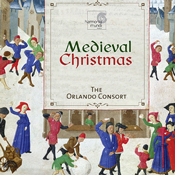Recently in Recordings
Dynamic now offers most of its product in CD and DVD formats, the latter in High Definition, no less.
With these three CDs of highlights from three Verdi operas - Nabucco, Il Trovatore, and Aida — Classics for Pleasure gives a snapshot of the arc of his career.
The opera world, always ravenous for talented, charismatic tenors, felt desperate hunger pains last summer, when Rolando Villazón canceled dates with an explanation that a health crisis necessitated a sabbatical from singing.
With a composer as widely beloved as Wolfgang Amadeus Mozart, for an opera to be all but forgotten suggests the work has problems beyond redemption.
For the opera of average length, a decent highlights disc can feature as much as half the score.
At the Rossini Festival held in Pesaro, Italy, Dynamic recorded two Rossini rarities in August 2006.
The late Guiseppe Sinopoli (1946-2001) became established as an estimable conductor of nineteenth-century music, and his legacy includes a number of fine recordings.
The best thing about this set, a Norma recorded live at the Teatro delle Muse di Ancona in late 2004, is the booklet essay by Marco Beghelli, offered in both English and Italian (no credit to any translator).
At one time, Verdi’s Aida figured as the most performed opera.
This Dynamic recording of Meyerbeer's Semiramide, an opera title more familiar with Rossini's name appended, mixes the pleasure of a modestly appealing surprise with regret at key aspects of the performance.
Among the choral music of Anton [Antonin] Dvorak, the familiar Stabat Mater, Op. 58, is known to modern audiences through various live performances and recordings.
A nostalgic charm permeates these filmed productions from the early 1970s of Lortzing's Zar und Zimmerman and Mozart's Die Zauberflöte, collaborations between the Hamburg State Opera and German TV director Joachim Hess.
The opera highlights series from Classics for Pleasure continues its recycling of the EMI catalogue with selections from two of Herbert von Karajan's recordings.
With this recording of songs by Henry & William Lawes, musical brothers who flourished in Caroline England, countertenor Robin Blaze with lutenist Elizabeth Kenny continue their exploration of early English song for Hyperion, and the results are stunning.
The title of this recording “Joy: the Laments of Gilles Binchois” introduces a seeming contradiction, one that plays on a contemporaneous description of the composer as "pére de joyeusetè"—the father of joy—in tension with an affinity for melancholy in his works.
Even though it is one of the important operas of the twentieth century, Arnold Schoenberg’s Moses und Aron is, perhaps, more esteemed than performed.
Premiered in 1926, Paul Hindemith’s opera Cardillac is a three-act work based on E. T. A. Hoffmann’s short story Das Fräulein von Scuderi.
In the 1983 production designed, staged, and directed by Jean-Pierre Ponnelle, this recording of Richard Wagner’s Tristan und Isolde is a solid and well-thought performance that has much to offer.
Recorded between 1938 and 1942, the excerpts from performances of Der Rosenkavalier, Die Frau ohne Schatten, Arabella, and Daphne at the Dresden Staatsoper are all conducted by Karl Böhm.
Why should anyone buy a German language broadcast of a delicious French opéra-comique?
Recordings

17 Aug 2008
Medieval Christmas
The festal days of Christmas, New Year’s, St. Stephen and St. Thomas Becket are rich in musical celebration, and this recording from the Orlando Consort brings together a wide range of organa, motets, chansons, and carols to remind us of that fact.
Their program is varied, perhaps to the point of straining the coherency of theme. Secular and sacred texts sit side by side, while the music’s chronology spans the Winchester Troper (c. 1000) and the sixteenth-century motets of Clemens non Papa, with visits to the 15-c English carol, a Dufay chanson, and music of the late 14-c Ars subtilior along the way. Additionally, the text theme itself is diverse—apart from proximity in the calendar, what do the Feasts of Becket and the proto-martyr Stephen have to do with Christmas, medieval or otherwise?
The varied repertory here also seems to underscore that the ensemble—naturally enough—is more at home in some styles than others; generally speaking, it is the earlier pieces that fare the best. The full and vibrant singing is well matched to the expansiveness of the Acquitanian polyphony (“O primus homo corruit,” and “Lux refulget”), and rhythmic panache engagingly enlivens both the robust conductus, “Annus renascitur” and the melismatic passages of Dufay’s “Ce jour de l’an,” where lombardic syncopations invite and receive appropriate verve. Equally impressive is the consort’s mastery of the complex, anonymous “De quan qu’on peut,” a subtilior work whose signature rhythmic density is handled with convincing ease. Additionally, in works like Arnold de Lantins’ “De quan qu’on peut,” the consort is much at home with courtly grace, and the distinctive timbres of the individual singers allow one to savor the richness of the counterpoint.
However, the sixteenth-century pieces are perhaps less successful, at least to ears drawn to a leaner purity of tone. The fullness and individuality of tone is at times attractive here, as in the duet sections of Clemens’ lengthy “Nato canunt omnia,” but in tutti contexts, these characteristics seem to constrain other expressive elements that might have come to the fore.
One of the riches of the recording is the consort’s impressive facility with historical, regional pronunciations, a facility that adds much color to the performance and helps to punctuate the variety of the program itself. Medieval Christmas is devoted to that variety, offering aural glimpses of late-December festivities in an array of contexts. The earlier glimpses are the best of the lot, though all will surely gratify.
Steven Plank
